- Strong declines in the crude oil market, approx. 10% from the peak
- History shows that after such a strong rebound wave, which we have seen since April, we should expect a 13-20% correction
- In nominal terms, the correction may even reach $35 per barrel for Brent crude oil
- The price drops are related to the end of the summer season (Labor Day in the USA), which indicates a decline in demand for petroleum products and a reduction in crude oil processing by American refineries
- According to Rystad Energy, the second lockdown this year could reduce global demand by approx. 3.7-4 million barrels per day
- The reduction in inventories in the United States and in OECD countries is mainly due to a decline in supply and to a lesser extent due to a rebound in demand
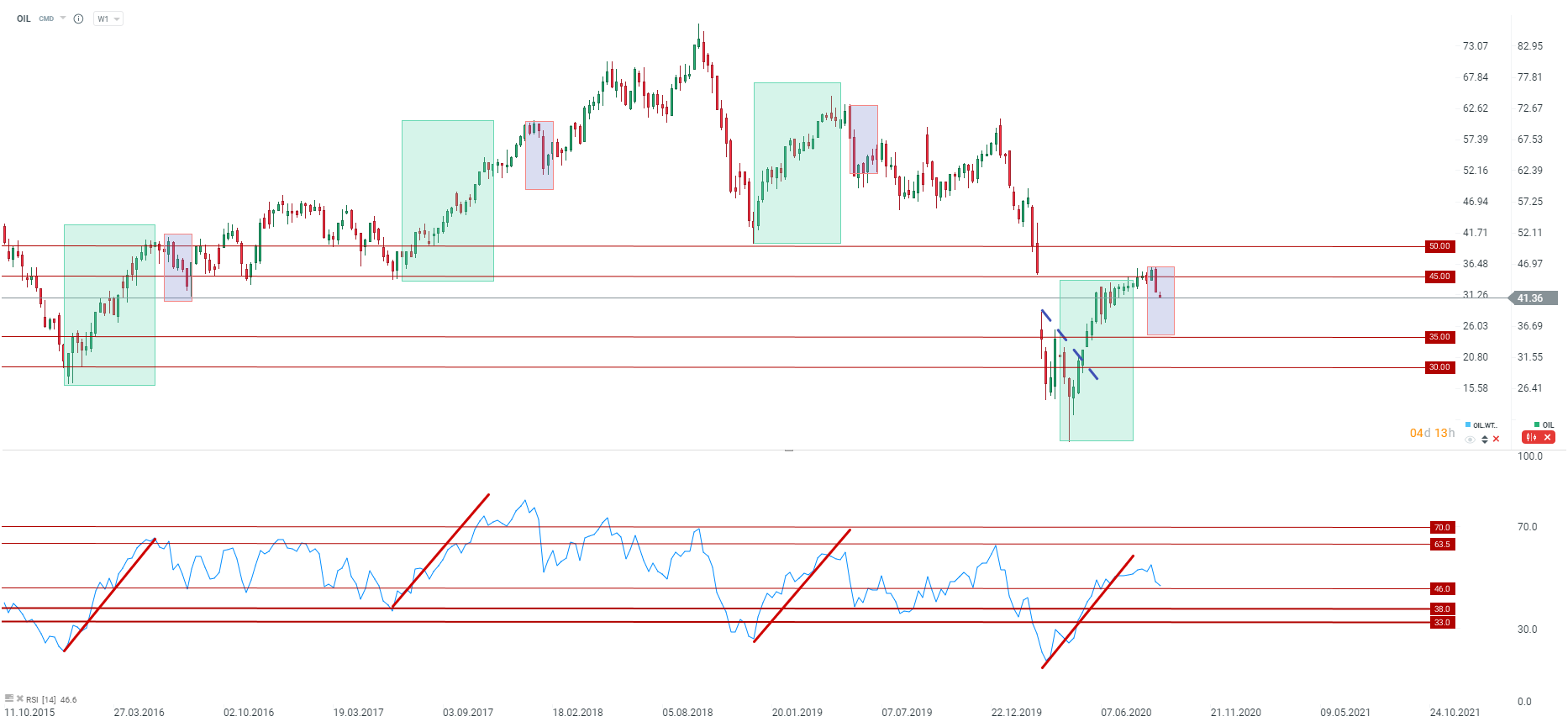 Once again, we are seeing a price pullback after an upward wave of $25-30 per barrel. In nominal terms, the price can be expected to drop even to $ 35 per barrel. On the other hand, in terms of the percentage decrease, we are close to a correction of 13%. Source: xStation5
Once again, we are seeing a price pullback after an upward wave of $25-30 per barrel. In nominal terms, the price can be expected to drop even to $ 35 per barrel. On the other hand, in terms of the percentage decrease, we are close to a correction of 13%. Source: xStation5
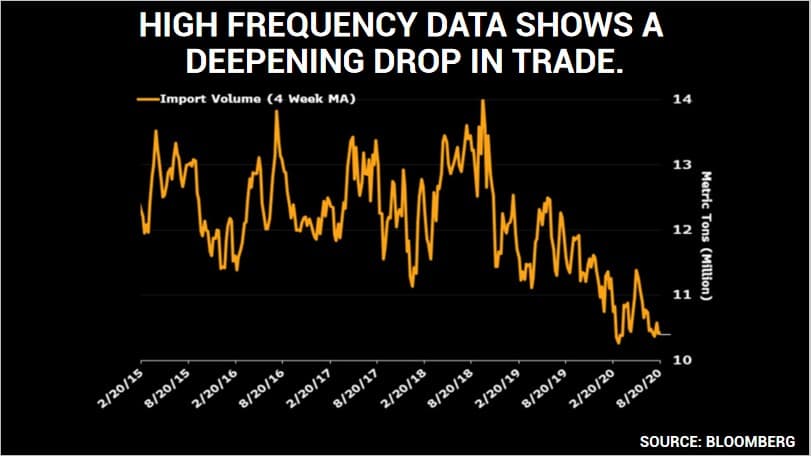 World trade is not looking very good, which shows that the normalization of the market is mainly due to production cuts. Source: Bloomberg
World trade is not looking very good, which shows that the normalization of the market is mainly due to production cuts. Source: Bloomberg
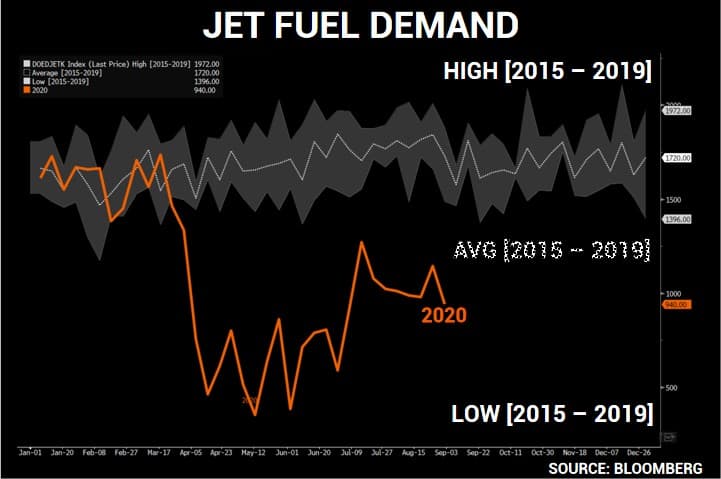 Aviation fuel demand is still far from pre-pandemic levels. Source: Bloomberg
Aviation fuel demand is still far from pre-pandemic levels. Source: Bloomberg
Natural gas:
- A price pullback in the gas market coincides with a pullback in the oil market
- At present, we are facing a decline in gas demand as the heatwave ends. However, it is worth remembering that the seasonal rebound begins at the turn of October and November
- Seasonality shows that we are still ahead of the second wave of increases. On the other hand, the increases we have seen in recent weeks have been excessive compared to the 5-year average volatility
- Rebound of gas deliveries to LNG terminals after Hurricane Laura. 4.27 bcf (+ 63% w / w), the highest since August 23.
- However, gas inventories continue to rise (seasonality indicates further increases until November) and are higher by approx. 13% compared to the 5-year average
- The positioning shows that the gas is extremely overbought
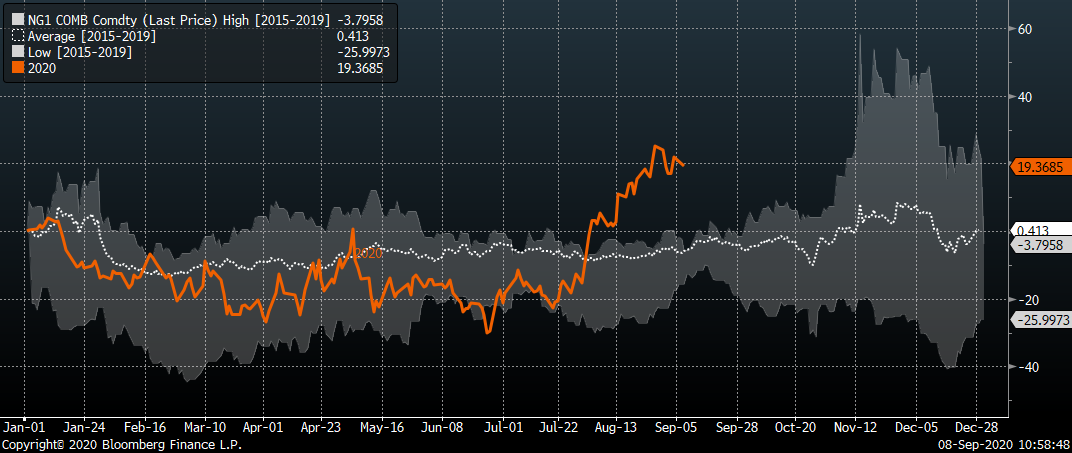 The seasonality of volatility shows stronger increases only at the turn of October and November. Source: Bloomberg
The seasonality of volatility shows stronger increases only at the turn of October and November. Source: Bloomberg
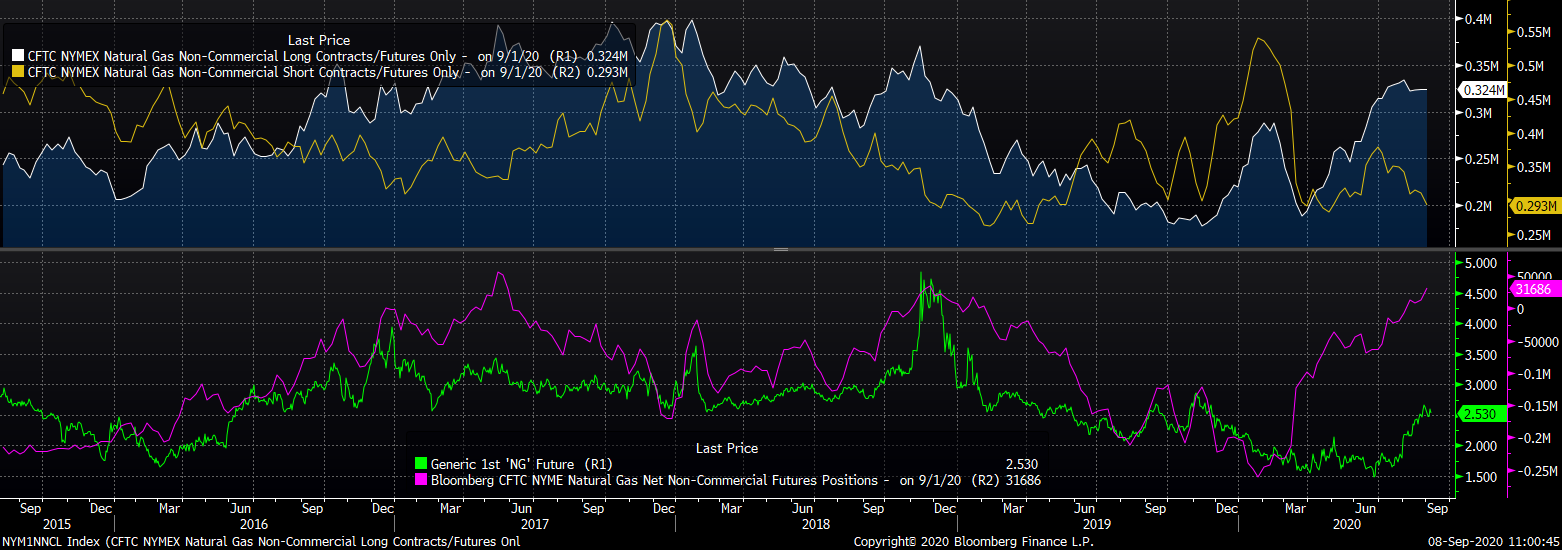 In speculative terms, gas seems to be quite heavily overbought. Source: Bloomberg
In speculative terms, gas seems to be quite heavily overbought. Source: Bloomberg
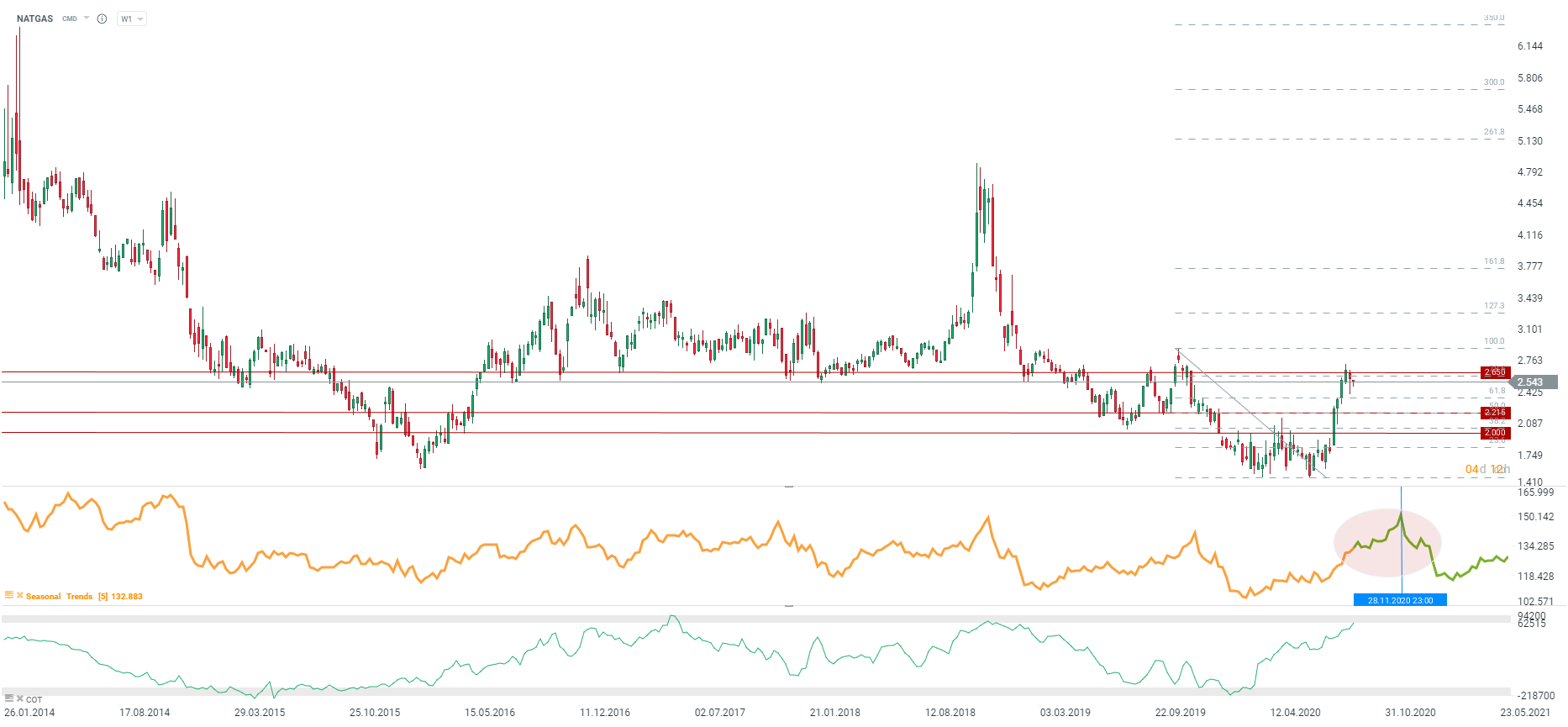 The seasonality of prices points to a consolidation until mid-October and a peak around the end of November. Nevertheless, gas is currently extremely overbought. History shows that extreme positioning was approaching the overbought zone in November, not around early September. Source: xStation5
The seasonality of prices points to a consolidation until mid-October and a peak around the end of November. Nevertheless, gas is currently extremely overbought. History shows that extreme positioning was approaching the overbought zone in November, not around early September. Source: xStation5
Coffee:
- Coffee inventories on the ICE exchange are at their lowest level since March 2000
- 855 bags of Brazilian coffee have been successfully verified by ICE for the possibility of delivery (port of Antwerp)
- However, ICE reports that 3,060 bags did not meet the delivery conditions (without specifying from where the coffee came from). It is known, however, that with the record production of 67 million bags in Brazil, only 3-4 million can meet the delivery conditions. Due to this fact, inventories may continue to decline, putting further upward pressure on coffee prices.
- An additional positive factor was the recent strengthening of the Brazilian real
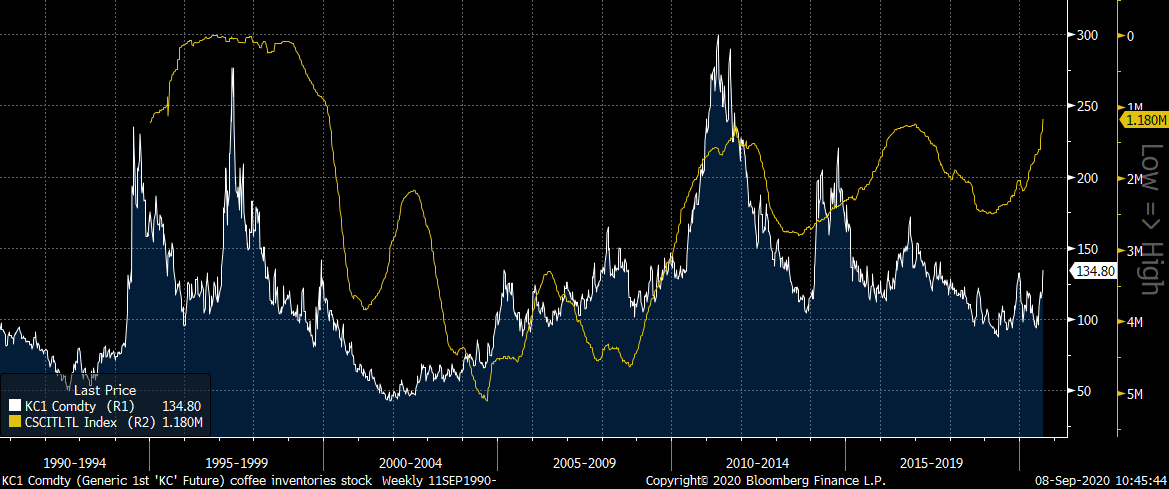 Coffee inventories are at their lowest since March 2000! Source: Bloomberg
Coffee inventories are at their lowest since March 2000! Source: Bloomberg
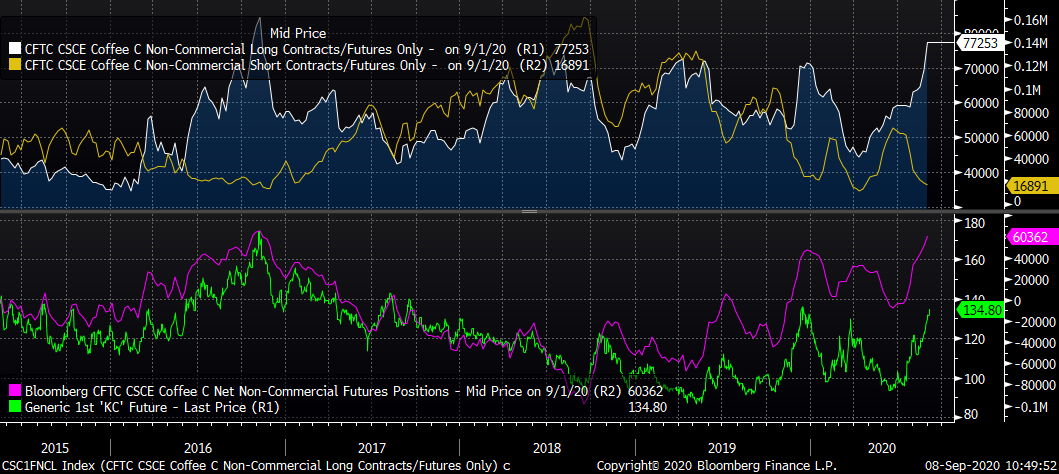 The number of long positions is the highest since 2016. The same can be seen with net positioning. Source: Bloomberg
The number of long positions is the highest since 2016. The same can be seen with net positioning. Source: Bloomberg
Sugar:
- Greenpool Commodities points out that the latest downward pressure on sugar was related to positions rollovers
- Another factor is the expectations of high sugar production due to the limitation in ethanol production in Brazil (still relatively low oil prices plus recent declines)
- Fitch points to a neutral stance on soft commodities. It points to low demand for biofuels and the fact that some countries still have not fully opened their economies after lockdown
- Interestingly, the positioning shows that sugar is very strongly overbought, which may lead to a further drop in price if the funds decide to change direction
- The International Sugar Organization significantly changes its deficit forecast for 2019/2020. Currently, it sees a deficit of only 140,000. tons, compared to the previous deficit forecast at 9.3 million. This is due to higher production in Brazil and demand problems due to the COVID-19 pandemic.
- Contango has increased recently, which suggests greater supply.
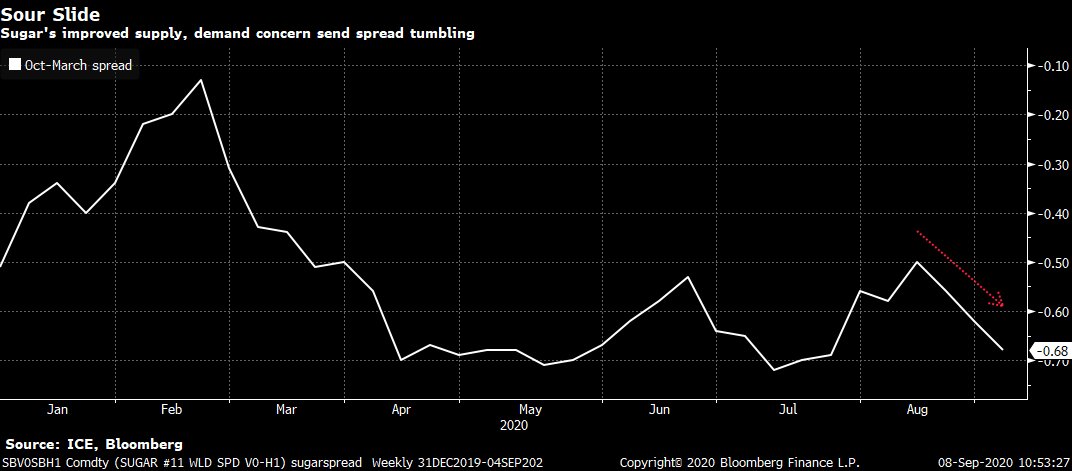 The widening of the October-March spread points to increasing supply. Source: Bloomberg
The widening of the October-March spread points to increasing supply. Source: Bloomberg
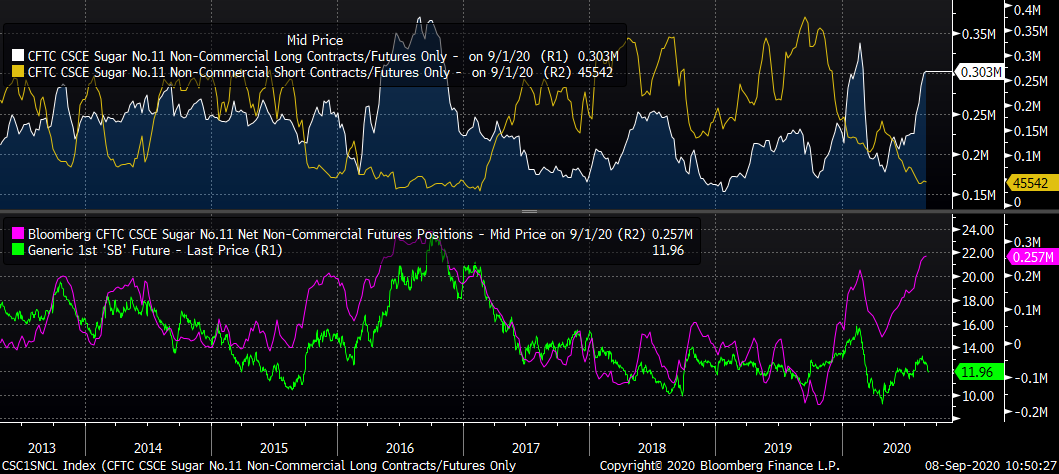 Interestingly, the positioning shows that sugar is very heavily overbought by speculators. Should funds change their bias, the downward move may be even stronger. Source: Bloomberg
Interestingly, the positioning shows that sugar is very heavily overbought by speculators. Should funds change their bias, the downward move may be even stronger. Source: Bloomberg
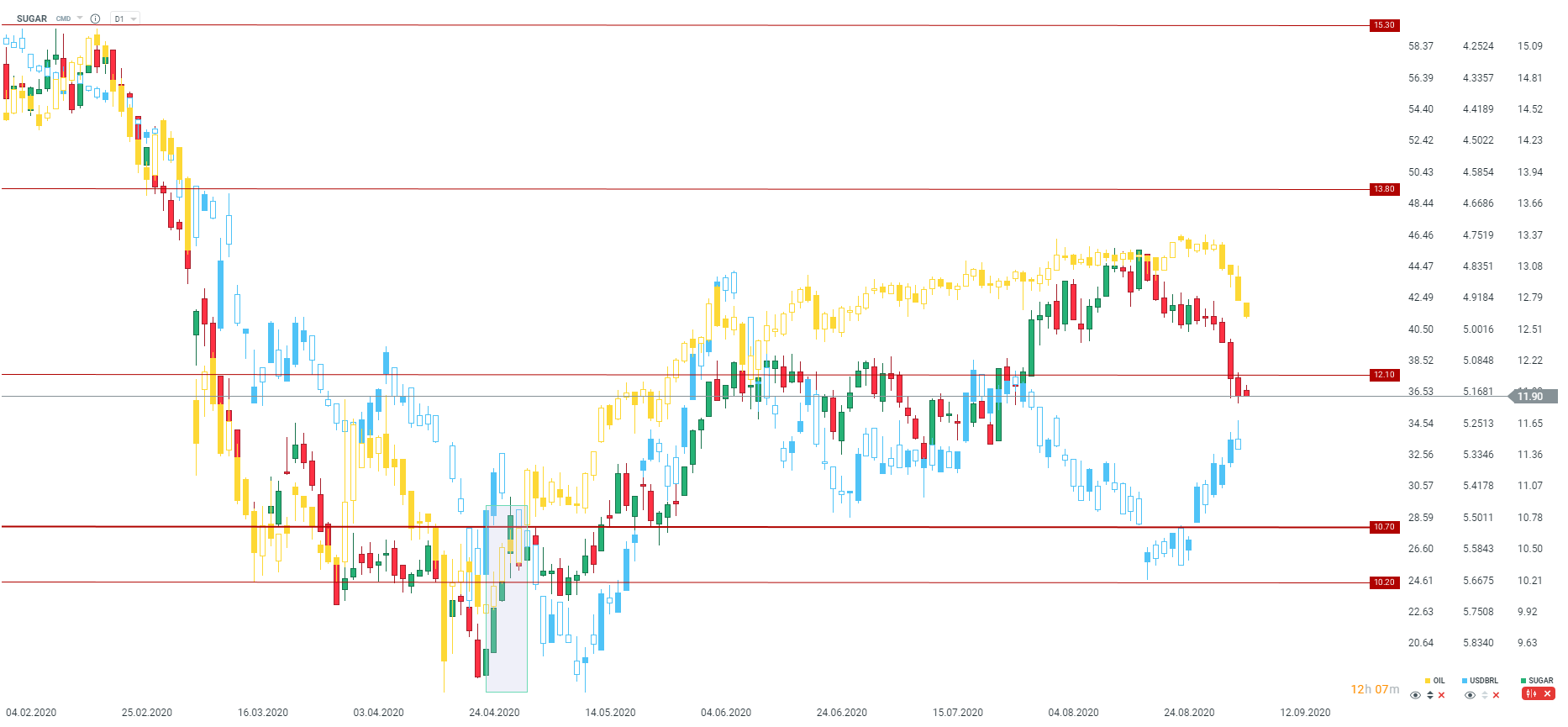 The recent strengthening of the Brazilian real closes the divergence with sugar. Source: xStation5
The recent strengthening of the Brazilian real closes the divergence with sugar. Source: xStation5
A kakaó korlátozottan reagált a gyengébb európai őrlési adatokra
Technikai elemzés: Az arany árfolyama a rekordmagasságról zuhan🔔
A kávé ára 5%-kal emelkedett, átlépte a 400 cent/font határt
Reggeli összefoglaló (14.10.2025)
Ezen tartalmat az XTB S.A. készítette, amelynek székhelye Varsóban található a következő címen, Prosta 67, 00-838 Varsó, Lengyelország (KRS szám: 0000217580), és a lengyel pénzügyi hatóság (KNF) felügyeli (sz. DDM-M-4021-57-1/2005). Ezen tartalom a 2014/65/EU irányelvének, ami az Európai Parlament és a Tanács 2014. május 15-i határozata a pénzügyi eszközök piacairól , 24. cikkének (3) bekezdése , valamint a 2002/92 / EK irányelv és a 2011/61 / EU irányelv (MiFID II) szerint marketingkommunikációnak minősül, továbbá nem minősül befektetési tanácsadásnak vagy befektetési kutatásnak. A marketingkommunikáció nem befektetési ajánlás vagy információ, amely befektetési stratégiát javasol a következő rendeleteknek megfelelően, Az Európai Parlament és a Tanács 596/2014 / EU rendelete (2014. április 16.) a piaci visszaélésekről (a piaci visszaélésekről szóló rendelet), valamint a 2003/6 / EK európai parlamenti és tanácsi irányelv és a 2003/124 / EK bizottsági irányelvek hatályon kívül helyezéséről / EK, 2003/125 / EK és 2004/72 / EK, valamint az (EU) 2016/958 bizottsági felhatalmazáson alapuló rendelet (2016. március 9.) az 596/2014 / EU európai parlamenti és tanácsi rendeletnek a szabályozási technikai szabályozás tekintetében történő kiegészítéséről a befektetési ajánlások vagy a befektetési stratégiát javasló vagy javasló egyéb információk objektív bemutatására, valamint az egyes érdekek vagy összeférhetetlenség utáni jelek nyilvánosságra hozatalának technikai szabályaira vonatkozó szabványok vagy egyéb tanácsadás, ideértve a befektetési tanácsadást is, az A pénzügyi eszközök kereskedelméről szóló, 2005. július 29-i törvény (azaz a 2019. évi Lap, módosított 875 tétel). Ezen marketingkommunikáció a legnagyobb gondossággal, tárgyilagossággal készült, bemutatja azokat a tényeket, amelyek a szerző számára a készítés időpontjában ismertek voltak , valamint mindenféle értékelési elemtől mentes. A marketingkommunikáció az Ügyfél igényeinek, az egyéni pénzügyi helyzetének figyelembevétele nélkül készül, és semmilyen módon nem terjeszt elő befektetési stratégiát. A marketingkommunikáció nem minősül semmilyen pénzügyi eszköz eladási, felajánlási, feliratkozási, vásárlási felhívásának, hirdetésének vagy promóciójának. Az XTB S.A. nem vállal felelősséget az Ügyfél ezen marketingkommunikációban foglalt információk alapján tett cselekedeteiért vagy mulasztásaiért, különösen a pénzügyi eszközök megszerzéséért vagy elidegenítéséért. Abban az esetben, ha a marketingkommunikáció bármilyen információt tartalmaz az abban megjelölt pénzügyi eszközökkel kapcsolatos eredményekről, azok nem jelentenek garanciát vagy előrejelzést a jövőbeli eredményekkel kapcsolatban.


